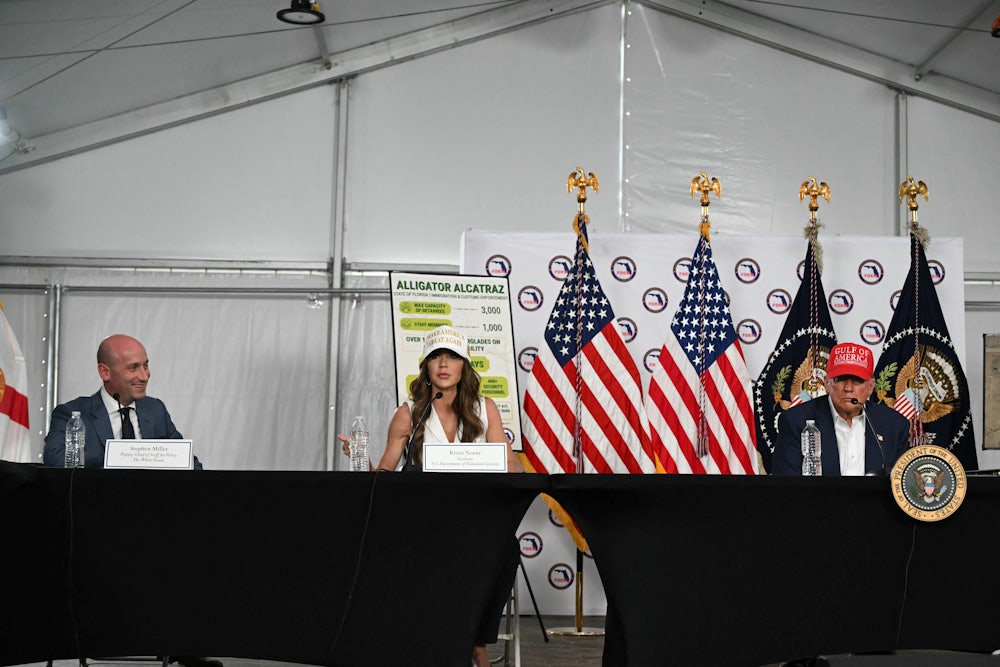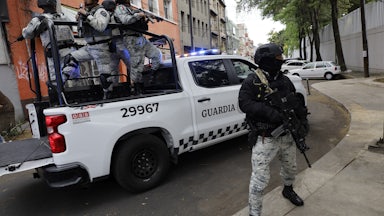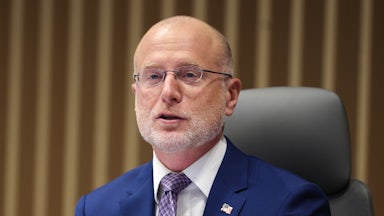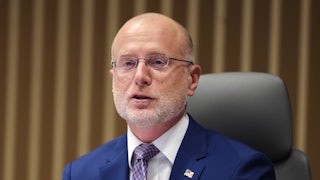Days after flooding in the Texas Hill Country killed 27 campers and counselors at Camp Mystic—just a portion of the more than 100 already confirmed dead in Central Texas—Immigration and Customs Enforcement shut down a children’s summer camp in Los Angeles’s McArthur Park. The raid is part of Homeland Security adviser Stephen Miller’s plan to flood the city with armored vehicles, drones, and ICE agents dressed for war, who’ve been kidnapping people from street corners, restaurants, and convenience stores.
Neither of these floods, or the destruction they’ve caused, should be understood as acts of God. While subsequent studies will be needed to determine the specific impact rising temperatures might have had on holiday weekend rain in Texas, researchers have already found that climate change has made those particular types of storms in that particular part of the country both wetter and warmer. The White House’s quest to destroy the Federal Emergency Management Agency will make recovery even more of a painful slog than it would have been otherwise. Republicans, for their part, haven’t shied away from comparing their plans—for FEMA, the administrative state, immigrants, and much more—to a deluge. “All we have to do is flood the zone,” former Trump adviser Steve Bannon famously told PBS in 2019. “Every day, we hit them with three things. They’ll bite on one, and we’ll get all of our stuff done, bang, bang, bang. These guys will never be able to recover, but we got to start with muzzle velocities.”
Although climate change has fallen out of political debates in the United States over the last few years, rising temperatures have been delivering destruction with muzzle velocity across the country. The Trump administration kicked off as wildfires in Los Angeles devastated homes from Malibu to Altadena. ICE agents prowling the streets of Southern California will find their balaclavas increasingly sweat-soaked as they contend with a brutal heat wave forecast to send temperatures into the triple digits. The National Weather Service is currently predicting severe thunderstorms across the mid-Atlantic and Great Plains, elevated fire risk in the West, and flash flooding in parts of Virginia and North Carolina, where workers are still picking up debris after Hurricane Helene destroyed the myth that Asheville would be a “climate haven.” Bang, bang, bang.
The climate crisis is every bit as disorienting as Bannon hoped the second Trump administration would be to its enemies, and those two crises complement one another. Republicans don’t have any real answers to climate-fueled destruction, of course; whether by way of Supreme Court rulings or the One Big Beautiful Bill Act, the right is actively destroying what modest progress the U.S. has made toward reducing its emissions. For the GOP, climate-fueled disasters are just another source of chaos they can exploit to argue against the inefficiencies of government overreach and in favor of restoring law and order with boots on the ground. Stephen Miller and Steve Bannon are realizing their most ghoulish, transformative fantasies as the climate crisis their party has spent decades denying plays out in real time. Continuing to avoid the subject won’t help defeat them. But climate politics in the era of Trump 2.0 ought to abandon its reliance on feel-good, far-off promises and reckon with the actually existing nature of the climate crisis in the United States: a deadly, expensive mess being supercharged by the right.
Pressed on the matter, most White House officials and GOP politicians stick to the half-baked party line about global warming being not that bad or actually somehow good. But they probably don’t think about it that much. The drumbeat of intensifying floods, fires, and hurricanes aren’t material realities for people without loved ones living in temporary FEMA housing after a hurricane; friends who can’t afford to rebuild the homes they saved up for that were inundated by floodwaters; children who were swept away from their bunks at sleepaway camps that their parents sent them to so they could work through summer without needing to seek out expensive childcare. The officials and politicians will be fine. Their indifference isn’t a function of age so much as wealth. Plenty of old people are on the losing end of the climate crisis, and some of the country’s oldest politicians recognize that threat clearly. Trump and his ilk are simply too rich to experience the climate crisis as anything other than a brutally hot day on the golf course. Any attempts to address it are “Green New Scams.”
For more and more people in the United States, though, climate change is a kitchen table and/or life-and-death issue. Some of the old, future-oriented truisms about the way that crisis would play out are wearing thin. In rich, Western countries, climate activism has sometimes imagined global warming as a far-off threat to be remedied by the once-in-a-generation business opportunity promised by green technologies. Leveraging that innovation to cap warming at 1.5 or two degrees Celsius—the ostensible goal of the Paris climate agreement—would prevent the most catastrophic outcomes, the worst of which will be cruelly distributed in the places with the least responsibility for cranking up emissions. In the U.S., many argued, our aging politicians are simply too old to recognize the threat of climate change. Won’t anyone think of the children?
None of this is wrong, per se. But too many of the slogans I grew up hearing, repeating, and writing about—as a campus climate activist; then as a journalist at protests, direct action camps, and U.N. climate talks—lent themselves to the idea that climate action was charity that today’s rich world might bestow upon the poor and future generations. In the Biden administration, especially, climate action was pitched as a golden ticket: Investing in green technologies would simultaneously reduce emissions, bring manufacturing jobs back to America, and allow the U.S. to beat China in the race to dominate twenty-first-century growth industries. Several governments already well acquainted with climate-fueled wet-bulb temperatures and hydroclimate whiplash, meanwhile, continued to demand that Western leaders furnish the funds needed to adapt to and recover from actually existing crises.
The problem isn’t just slogans, though. Confronting the climate crisis isn’t only a matter of building out as much zero-carbon power as possible, winding down fossil fuels, and electrifying everything. For millions of Americans, it’s already an affordability crisis that’s showing up in their mortgage payments, rent, and monthly bills. These aren’t unrelated. Utilities eager to “rate-base” new fossil fuel infrastructure load can force their customers to pay those costs, increasing the already sky-high electricity bills we pay to stay cool in the summer. For years those companies have even made their customers pay for their membership in trade organizations like the Edison Electric Institute, which lobby against renewables and climate policy at every level of government.
In the U.S., climate change isn’t some looming cataclysm but a creeping drain on our monthly finances and quality of life. Poorly insulated apartments get more expensive as landlords pass on the cost of skyrocketing insurance premiums, forcing tenants to keep the A.C. off even as temperatures climb to dangerous, record-breaking heights. Some flood, tornado, or hurricane renders childhood homes uninhabitable. Relief is harder and harder to come by as Republicans continue to hollow out FEMA, divert funds to ICE, and cut off funding to local emergency management offices. The displaced drain their savings moving into motels and pick up a second job working overnight in sweltering Amazon warehouses.
Maybe the biggest pay-off from the decades polluters spent funding climate denial is that all of these insults are still widely considered to be isolated. The answer to this isn’t better climate messaging but tangible policies that help working people live more comfortably and affordably as temperatures rise, and cracking down on the companies looking to profiteer off and deepen their suffering. The alternative is letting Stephen Miller and the GOP capitalize on the climate crisis as an excuse to make the U.S. even hotter, pricier, and more dangerous.










